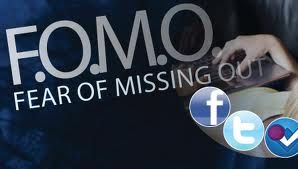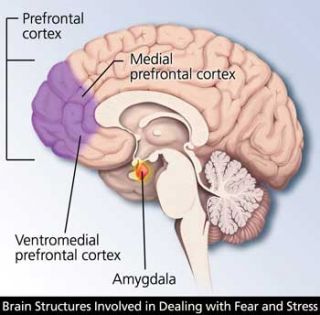Media
Always On, All the Time: Are We Suffering From FoMO?
Social media, multitasking, and e-communication can lead to Fear of Missing Out.
Posted May 2, 2013

FoMO: Fear of Missing Out
I used to snicker at those people who couldn't sit through a 90-minute movie without checking their text messages or social media and wondered why anyone would want to disrupt their sleep by checking e-mail or other communications whenever they woke up during the night (if you don’t wake up several times then you are probably way younger than I am!).
Now I am not so sure that I am exempt from the draw of staying connected. I find myself turning my phone on surreptitiously in my pocket just as wheels touch the tarmac and since my phone is my alarm clock (or so I tell myself) I find my eyes straying to the blackened screen when I stumble to the bathroom somewhere around 5 AM. The draw is intense and it is reflected in a series of studies that have been highlighted in the media lately.
- “3 in 4 Young Smartphone Owners Check Their Devices as Soon as They Wake Up”
- “8 in 10 Smart Device Owners Use Them ‘All the Time’ on Vacation”
- “Young People Completely Wedded to Their Mobile Phones: 40% of 18-30-year-olds in the U.S. Check Their Smartphones at least once every 10 minutes”
- “Smartphone Users Check Facebook 14 Times a Day”
- “Half of Mobile Phone Owners Always Have Their Device Within Arm’s Length”
According to Dr. Andrew Przybylski of the University of Essex, many of us are suffering from FoMO or “Fear of Missing Out.” According to his recently published study in the journal Computers in Human Behavior, “FoMO is characterized by the desire to stay continually connected with what others are doing.” That sure sounds like many people I know. Although I do not post on Facebook all that often I have noticed a trend: There are a handful of people who will respond either with a comment or a “like” within a few short minutes of anything I post. And the most interesting part is that these are not people that I know well at all. In fact, they are people that I rarely see and do not consider being a “friend.”
Dr. Przybylski and his colleagues found that people under 30 were more likely to fear missing out—not surprising to me given the work I have done comparing the most recent Net Generation, iGeneration and Generation “C” on their values, beliefs and technology usage—and that social media was most often the culprit. They also discovered, in a series of three studies, that if peoples’ psychological needs were deprived—particularly those needs for competence, autonomy and relatedness—they were more likely to have higher FoMO scores. They also reported that, “… the elevation of negative social and emotional states such as boredom and loneliness linked to social media usage also relate to FoMO.”

The main result, at least for someone who studies the impact of social media like myself, is that, “… fear of missing out played a key and robust role in explaining social media engagement over and above the other factors we considered.” In other words, although the study was not “causal” in nature, it appears that social media either cause or exacerbate FoMO. Another corollary to this finding from their final study is that those university students who were high in FoMO tended to be those who were using social media more in general, more quickly upon waking, just before going to sleep, during meals, during lectures, and while driving a car.
It is no surprise that FoMO appears to drive behaviors that are launched to connect and it is even less of a surprise that, at least among young people, these connections are mostly virtual. In study after study we find that members of the three youngest generations prefer to connect with their friends and family virtually, through text messages, social media and even e-mail as opposed to face to face. As one young person told me when I was writing iDisorder,
“If I talk to someone face to face (or even on the phone) I have to pay total attention and ‘unitask’ and that is not how I run my life. I am constantly doing many things at the same time and after I send a text or post on one of my social media sites, I have time to do other things before getting responses. It’s just more efficient.”
In research done in the George Marsh Applied Cognition Lab that I co-founded with my two colleagues, Dr. Mark Carrier and Dr. Nancy Cheever, we are finding the impact of social media and electronic connection everywhere we look. When we watched students studying in their homes the biggest distractors were Facebook and texting. When we assessed symptoms of psychological disorders, Facebook was the main predictor, both in positive and negative ways. Having more Facebook friends (along with talking more on the telephone) predicted fewer symptoms of dysthymia (mild depression) and major depression while using Facebook more often, having more Facebook friends and doing more “impression management” by posting comments, photos and status updates, predicted more symptoms of many other disorders including narcissistic personality disorder, mania, antisocial personality disorder, histrionic personality disorder and compulsive disorder even after factoring out anxiety about not being able to check in with social media and other technologies (our version of measuring FoMO). In fact, social media use accounted for nine of the 15 significant predictors of psychological disorders after factoring out all other relevant demographic, attitudinal and anxiety-based variables. Although not yet published, we have found that social media use also impacts sleep (negatively) and online empathy (positively). I guess that an activity that we all do all day long, and accounts for nearly one in four minutes on the Internet, must have an impact on us.
I find the concept of FoMO to be quite compelling when I speak to audiences around the world. Most people, particularly parents and students, readily indicate by their nonverbal communication (lacking on social media) that they, too, feel this pull. If you want to see how you rate on FoMO you can do so at http://www.ratemyfomo.com.
Is there a “cure” for FoMO? If you read my blog here or on the Huffington Post, you know that my view is that it all rests on understand what technology does to our brains.

We are not automatons that can stay connected to the Internet, gleefully task switching for hours on end without breaks, and expect ourselves to not feel anxiety about missing out on something that “might” happen when we are disconnected. My philosophy rests on work done by Nathaniel Kleitman, one of the pioneers of sleep research, who found that similar to our 90-minute sleep cycles, we have a BRAC—Basic Rest Activity Cycle—during awake periods and that those cycles are also about 90 minutes in length. This should not surprise you. After an hour or two of work you need a break. Luckily for the workaholics or FoMOers among us neuroscience has shown us that short breaks, no more than 10 minutes in length, can reset our brains and restore them to a calm state, ready to begin task switching mania once again. Taking a walk outside, exercising, meditating, listening to music (unitasking) or talking to a friend all calm the brain. You know what calms your brain. Practice doing something to calm your brain every 90 minutes and perhaps you will avoid that FoMO feeling.
[I think I will go make a cup of coffee and work on the Thursday NYT crossword. That calms my brain!]




